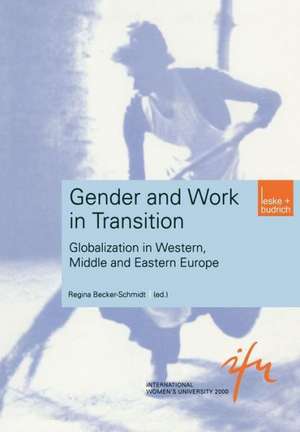Gender and Work in Transition: Globalization in Western, Middle and Eastern Europe: Schriftenreihe der internationalen Frauenuniversität "Technik und Kultur", cartea 2
Editat de Regina Becker-Schmidten Limba Engleză Paperback – 31 ian 2002
Preț: 390.25 lei
Nou
Puncte Express: 585
Preț estimativ în valută:
74.68€ • 78.16$ • 62.15£
74.68€ • 78.16$ • 62.15£
Carte tipărită la comandă
Livrare economică 01-15 aprilie
Preluare comenzi: 021 569.72.76
Specificații
ISBN-13: 9783810032522
ISBN-10: 3810032522
Pagini: 292
Ilustrații: 291 p. 12 illus.
Dimensiuni: 170 x 244 x 15 mm
Greutate: 0.47 kg
Ediția:2002
Editura: VS Verlag für Sozialwissenschaften
Colecția VS Verlag für Sozialwissenschaften
Seria Schriftenreihe der internationalen Frauenuniversität "Technik und Kultur"
Locul publicării:Wiesbaden, Germany
ISBN-10: 3810032522
Pagini: 292
Ilustrații: 291 p. 12 illus.
Dimensiuni: 170 x 244 x 15 mm
Greutate: 0.47 kg
Ediția:2002
Editura: VS Verlag für Sozialwissenschaften
Colecția VS Verlag für Sozialwissenschaften
Seria Schriftenreihe der internationalen Frauenuniversität "Technik und Kultur"
Locul publicării:Wiesbaden, Germany
Public țintă
ResearchCuprins
I: Notions and Concepts in the Context “Gender and Work in Transition”.- 1. Theorizing Gender Arrangements.- 2. Globalization and Gender.- 3. Women’s Work and Economic Development.- 4. Feminist Theories of Democracy and the Dispute of Difference.- 5. Gendered Segregation of Work.- II: Case Studies.- 6. New Family Patterns: Germany After Unification.- 7. Eastern Germany: Changes in Temporal Structures in Women’s Work After the Unification.- 8. Economic Restructuring, Social Policies, and Women’s Work in Poland.- 9. The Gender-specific Division of Labor in Hungary Since the Regime Change.- 10. Women in the Labor Market in Russia.- III: Outlook.- 11. New Visions — Old Roles: The So-called Third Sector, “Citizen Work” and Other Concepts and Their Impact on Gendered Division of Labor — Referring to Industrialized Countries.
Notă biografică
Dr. Regina Becker-Schmidt, Dipl.-Soz., Professorin am Psychologischen Institut, Fachbereich Philosophie, Geschichte und Sozialwissenschaften, Universität Hannover
Textul de pe ultima copertă
World wide economic, political and cultural changes transform labor markets, frames of divisions of work, labor organization and famly structures. This can be demonstrated in a specific way in Western, Middle and Eastern Europe, where globalization and forced technology development from the one side cross with transformations processes in forms of government from the other side. Our investigation within this context emphasizes the question, how the living conditions of working women in comarison with those of men are touched by these social overturns.
The findings presented in this volume throw light on the ambiguities which political transformation and economic globalization effect on women´s work. Women profit by the emergence of working places that are brought force by new market-activities. But at the same time many of them lose qualifies occupations by shifting from full-time to part-time jobs, from high paid sectors to low remunerated industries. In all countries we find gender-based income differences. The proportion of women in political organizations is everywhere lower than that of men. The growing time pressure in the employment system reinforces women´s strain to combine household duties, child raising and paid work. Going beyond Europe we have to recognize the widening gap between industrialized regions and developing countries.
The findings presented in this volume throw light on the ambiguities which political transformation and economic globalization effect on women´s work. Women profit by the emergence of working places that are brought force by new market-activities. But at the same time many of them lose qualifies occupations by shifting from full-time to part-time jobs, from high paid sectors to low remunerated industries. In all countries we find gender-based income differences. The proportion of women in political organizations is everywhere lower than that of men. The growing time pressure in the employment system reinforces women´s strain to combine household duties, child raising and paid work. Going beyond Europe we have to recognize the widening gap between industrialized regions and developing countries.















